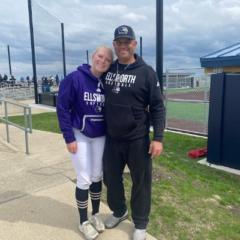Activity
Mon
Wed
Fri
Sun
Jan
Feb
Mar
Apr
May
Jun
Jul
Aug
Sep
Oct
Nov
Dec
What is this?
Less
More
Memberships
"Train With The Pack"
62 members • Free
Instant Clients $97 Ads Group
704 members • Free
4 contributions to "Train With The Pack"
One day or Day 1?!?
Daily disciplines start today! Be the future YOU that YOU want right now! Start TODAY! ATTACK the Work!
Received this on my Facebook Feed today, I needed to share!
Coaches, Many of you are calling the pitches for your pitchers and that's great BUT, don't forget: 1. To explain to your pitcher and catcher WHY you call the pitches you do so they can learn. 2. To teach them to look at a batter's swing and stance prior to pitching. 3. To still have your catcher give the sign so they can get used to doing this. 4. For new pitchers, make sure they know to receive the sign ON the mound. 5. For newer pitchers, make sure they know to give their catcher time to adjust their glove before throwing. 6. For more experienced catchers, start to let them call the game even if this means juust for an inning or two when you have a major lead. Let them start to learn this skill. 7. If you have a pitcher or catcher sitting the bench, have them sit next to you as you call pitches so you can explain the rationale to them. They'll learn a lot more than just sitting on the bench. 8. If you are not a skilled coach in this area, find someone who is and can call pitches. Pitchers work hard on this at their lessons so just calling random pitches or just calling fastballs only (aside from new pitchers), won't help them grow as a pitcher. Still unsure of who can do this efficiently? Check with the pitcher's parent. Most of the time they're the ones at their lessons and know their strengths and weaknesses. I want to add a little here from my experience. My daughter is a competitive softball player and a catcher. I taught her from day one that her job is to manage the game, the pitcher, and the energy of the team. Watch her play now, and you will know what works on the field. Your kids are capable of far more than you give them credit for, but you have to let them do it, fail, and do it again! They will always surprise you!

Interview with Coach Matt Phillips (CEO/Founder of Pro Athlete Advantage)
The Importance of Mental Toughness in Sports Mental toughness is often touted as a critical component of athletic success, yet it remains one of the most misunderstood concepts in sports. While physical skills and talent are essential, the mental aspect can be the differentiator between good and great athletes. Mental toughness encompasses resilience, focus, and the ability to manage emotions under pressure. Athletes who cultivate these traits are better equipped to handle the ups and downs of competition, making it crucial for coaches to prioritize mental training alongside physical preparation. Creating a Holistic Athlete: Beyond the Field The concept of a holistic athlete goes beyond just excelling in their sport; it involves developing well-rounded individuals who can thrive in various aspects of life. Coaches play a pivotal role in this development by fostering an environment that encourages personal growth, emotional intelligence, and leadership skills. By integrating mental training into their coaching practices, they can help athletes build confidence, improve their decision-making skills, and enhance their overall performance both on and off the field. The Role of Coaches in Mental Development Coaches are not just instructors of physical skills; they are also mentors who can significantly influence an athlete's mental development. By adopting a coaching philosophy that emphasizes mental toughness, coaches can create a culture of accountability and resilience within their teams. This involves teaching athletes how to set goals, manage stress, and maintain a positive mindset, which are all essential skills for success in sports and life. Coaches who prioritize mental training can help their athletes navigate challenges more effectively, leading to improved performance and personal growth. Building a Supportive Community Creating a supportive community is vital for fostering mental toughness among athletes. This community includes coaches, teammates, parents, and mentors who encourage open communication and collaboration. When athletes feel supported, they are more likely to take risks, learn from failures, and push their limits. Coaches can facilitate this by promoting teamwork, encouraging peer feedback, and creating opportunities for athletes to share their experiences and challenges. A strong community not only enhances individual performance but also strengthens team dynamics.
Phones are delaying athlete development.
Since phones were introduced in 2007 coaching athletes has become much more difficult but not for the reason you may think. Athletes are coming to you less equipped mentally, leaving coaches in a tough spot. We are in s different sports ecosystem now, we know coaches can coach baseball but are struggling with behaviour. The Mental Game Academy is here to equip coaches with the necessary cognitive strategies to develop this new distracted athlete. Check us out: https://thementalgameacademy.ca/

1-4 of 4
@matt-phillips-9228
I am Matt Phillips, the Founder of Pro Athlete Advantage. My mission is to build "Mentally Tough", Stand-Out Student-Athletes in Sports and Life.
Active 395d ago
Joined Apr 16, 2024
Powered by




